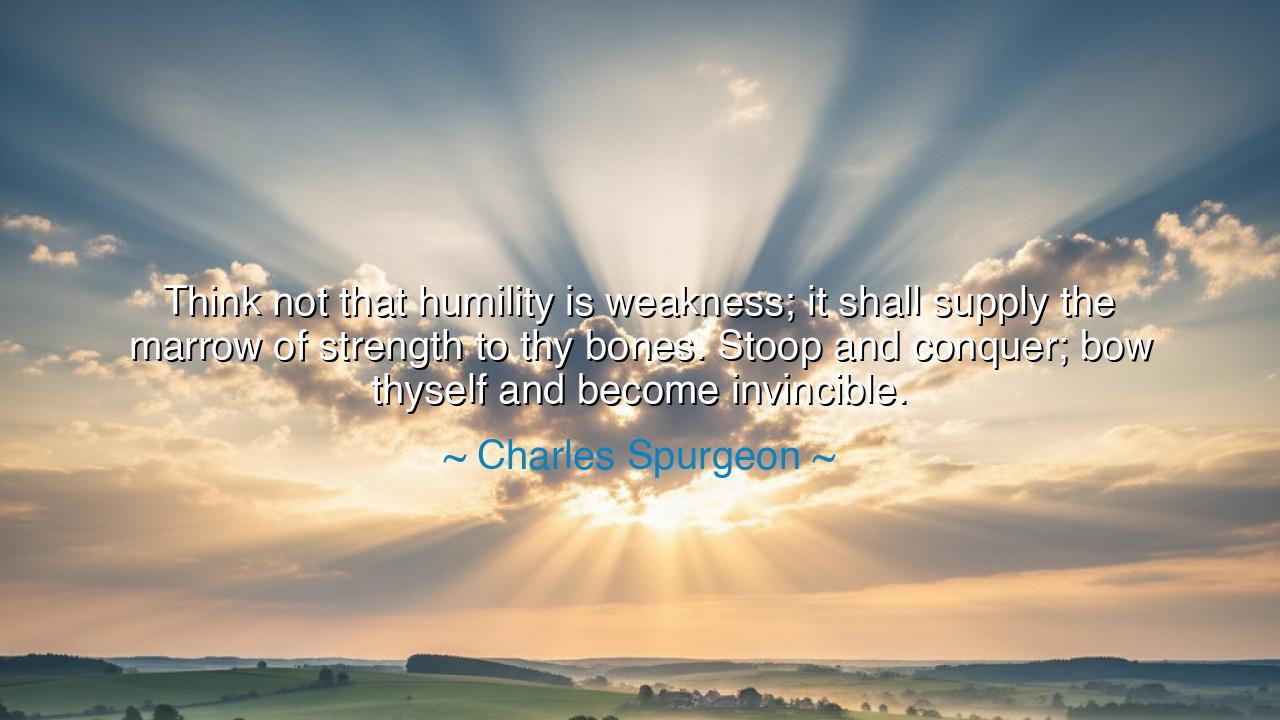
Think not that humility is weakness; it shall supply the marrow
Think not that humility is weakness; it shall supply the marrow of strength to thy bones. Stoop and conquer; bow thyself and become invincible.






Hear the solemn and fiery voice of Charles Spurgeon, preacher of truth and thunderer of wisdom: “Think not that humility is weakness; it shall supply the marrow of strength to thy bones. Stoop and conquer; bow thyself and become invincible.” In this utterance, Spurgeon overturns the false judgments of men who confuse gentleness with frailty and meekness with defeat. He reveals that humility is not the breaking of spirit, but the root of all strength. To bow does not mean to be broken; it means to be grounded, rooted, and unshakable.
Spurgeon’s imagery is vivid. He speaks of humility as marrow, that secret substance hidden within the bones which nourishes and sustains life itself. Without marrow, the bones are brittle; without humility, the soul is hollow. Many imagine strength to be found in boasting, in pride, in dominance. Yet pride is fragile, cracking under weight, while humility supplies the hidden fortitude that endures trials, resists temptation, and grows greater with every test.
This truth has been proven again and again in history. Consider George Washington, commander of armies and father of a nation. At the height of his fame, when he could have crowned himself king, he laid down his sword and returned to his farm. Many called this act of humility weakness, but it made him immortal. By bowing, he conquered the greatest temptation of all: the lust for power. His refusal to exalt himself gave America a republic instead of a tyrant. In his humility lay invincibility.
Even in spiritual realms this truth shines bright. Jesus of Nazareth, whom Spurgeon so fervently preached, washed the feet of his disciples—an act of service and humility. The world mocked such stooping, but that very act became the greatest conquest of all: a symbol of power through love, dominion through sacrifice. The might of Rome’s legions has long since crumbled into dust, but the act of bowing in humility endures, shaping hearts and civilizations. Thus, to stoop and conquer is not poetry but eternal law.
Yet humility must not be mistaken for cowardice. The man who bows in humility is not weak, but wise. He knows when to yield, when to listen, when to learn. Pride blinds, but humility opens the eyes. Pride makes a man brittle, snapping at the first blow, while humility bends and rises again. The humble man grows stronger with every storm, because he does not waste his strength defending his pride. His victory is not loud, but certain.
Understand this, O seeker: the mightiest leaders, the greatest saints, and the wisest sages have all walked the path of humility. It is the armor that no arrow can pierce, the foundation that no earthquake can shake. The one who bows in humility learns endurance, gains wisdom, and rises above enemies, for he is not weighed down by the chains of pride. The proud man is defeated by his own vanity; the humble man conquers by patience and resolve.
Let this be your lesson: do not despise humility, and do not mistake it for weakness. Practice it in your dealings with others—listen more than you speak, serve more than you demand, and be willing to bow when pride tempts you to boast. In so doing, you will build the hidden marrow of strength in your spirit. You will find that humility is not the loss of power, but its truest form—power that cannot be stolen, corrupted, or destroyed.
Thus is the teaching of Spurgeon: “Stoop and conquer; bow thyself and become invincible.” Take these words as armor for your life. For the one who humbles himself shall endure, and the one who endures shall conquer. And in humility, you will discover not weakness, but a strength eternal, unbreakable, and divine.






AAdministratorAdministrator
Welcome, honored guests. Please leave a comment, we will respond soon